Actor's
Movement Studio Summer Institute
Theater Intensive Faculty
Five week (full-time or part-time program) June 1 - July 1

|
 |
Faculty featured in American Theater Magazine
Faculty featured in “Movement for Actors” by Nicole Potter
Internationally Acclaimed Guest Artists and Master teachers |
| |
Artistic Director and Core Faculty Summer Institute
Janice Orlandi - Artistic Director of Actors Movement Studio Conservatory NYC |
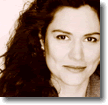
 |
Theater Movement and Character and Style Specialist, She is a Movement and Period Style specialist, certified teacher and teacher trainer of Williamson Physical Technique for Actors, including period/styles, character and period dance. She is also a certified teacher of Michael Chekhov Technique, Personally trained with Mala Powers Executrix of the Michael Chekhov estate, also studied Michael Chekhov Technique with Joanna Merlin, Jack Colvin, who studied with Mr. Chekhov directly. Also trained in Viewpoints and Composition with Anne Bogart, Tina Landau and SITI Company. Trained in Rasaboxes with founder Richard Schechner NYU Performance Studies.
Featured in American Theater Magazine and Back Stage in 2011.
She has taught Michael Chekhov Technique, Movement for Actors, Viewpoints, Composition and Period Styles, for over eighteen years in educational institutions in the United States and Europe, including, Assistant Professor The University of the Arts, Philadelphia, Mason Gross School of the Arts; Rutgers State University; Williamstown Theatre Festival; de Lindenberg Centrum voor de Kunsten, Netherlands; State Theatre School in Odense, Denmark, and Ophelia Theatre School in Copenhagen; New York State Summer School of the Arts (NYSSSA), the NY Conservatory for Dramatic Arts and School for Film and Television NYC., Esper Studio, Maggie Flanagan Studio and Gately Poole Studios, Williamson movement instructor.
She has been a chorographer, movement and style coach for Mirror Repertory Company, Princeton Repertory Shakespeare Festival, Sonnet Rep, Players Theater, Act One, Williamstown WTF. She is the founder of the AMC Sumner Theater Institute for physical theater training, Teen Shakespeare Conservatory and Teen Shakespeare Summer Intensive. She recently worked with Mercedes Ruehl as movement coach for her portrayal of Frida Kahlo in the Bay Street Theatre production of Viva La Vida! Former Students: Tom Pelphrey, Guiding Light, Emmy Award winner 2006 2008; End of the Rainbow Broadway, Micah Alberti, All My Children, Guiding Light and Wildfire Fox Five, Emory Cohen “Smash” (AEA) & (SAG) ATME National Association of Movement Educators.
|
Director:

|
Period Style Coach:

|
|
Bette Davis Ain’t for Sissies
Edinburgh Festival 2013. |
www.TheOtherMozart.com
Spoleto Festival New Orleans |
|
| |
| |
Actors Movement Studio Summer Institute Curriculum & Faculty featured in "American Theater Magazine"
Let's Get Physical: What's Happening Now?
U.S. movement teachers prefer either a hybrid or an integration of disciplines in the service of training the actor's body
~ By Nicole Potter |
| |
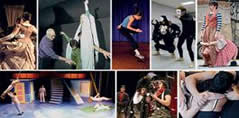
Images: (first top -last Bottom row): Janice Orlandi's summer program at Actors' Movement Studio

|
Article Excerpts:
"Janice Orlandi, artistic director of the Actors Movement Studio Conservatory and Associate Professor at the University of the Arts in Philadelphia, is trained in Williamson Technique, but also teaches integrated systems. "This semester it's a study of psychophysical techniques that I am crossing—one of them is Williamson, one is Michael Chekhov and the third is Rasaboxes. I'm using the framing of these different pedagogies to enhance and to expand one another," says Orlandi.
Orlandi, who now runs the studio that Williamson founded, has not only broadened her own knowledge, she's expanded the curriculum of the studio. Its summer institute offers intense training with master teachers from a wide array of movement disciplines, including Chekhov, Rasaboxes, Viewpoints, Margolis Method, Laban and Feldenkrais.
Williamson Technique was created by Loyd Williamson, who refers to his discipline as "the physical process of acting." The basic concept behind his approach is this: The five senses establish contact with the outer world, which leads to inner experience, which produces outer behavior, which leads back to new contact with the outer world.
Williamson is an accrued technique that can ideally be learned over the course of several semesters of study. It begins with heightening awareness of the senses, the imagination and the body, and progresses through learned movement phrases and character exercises, culminating in a Salon Project, an extended exploration of period and style." |
| |
Core & Founding Faculty Summer Institute |
| |
| Loyd Williamson - Founder and Former Artistic Director of Actors Movement Studio |
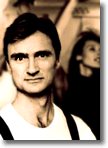
Featured in “Movement Actors” and “Acting
Teachers of America”

 |
Loyd Williamson is the founder and Former Artistic Director of Actors Movement Studio. He is the creator and author of the Williamson Physical Technique, and of The Williamson Advanced Period Style Project, "The Salon"(TM )
Featured in “Movement Actors” and “Acting Teachers
of America”
He was the principal Movement Professor at The School of the Arts, Rutgers University from 1979 to 2001; served on the faculty of HB Studio for eleven years; He is the creator and author of the Williamson Physical Technique, and of The Williamson Advanced Period Style Project, "The Salon"(TM ) visiting professor at the Tish School of the Arts for three years; for The Juilliard School; and the Princeton Shakespeare Festival.
He has taught classes and coached actors on Broadway, and in Feature Film, Television, Regional theaters, and many conservatories.He has served as coach for such actors as Elizabeth Ashley, James Gandolfini, Nastassja Kinsky, Kevin Kilner, Jody Foster, and others. He has been artistic consultant for Broadway productions of Suddenly Last Summer, and Holliday; for feature films Maria's Lovers (assistant to the director) Andre Koncholovshy , director, with Robert Mitchem, Keith Carrodine, Natassja Kinsky; Alphabet City with Zora Lambert and Vincent Spano, Amos Poe director; for stage, Othello with Delroy Lindow , Great Lakes Shakespeare Festival; with Avery Brooks for the Folger Theater in Washington DC, Hal Scott, director; for The Beggars Opera at the Juillard School , Michael Langham, director; for Hamlet, Merchant of Venice, Twelfth Night, Much Ado About Nothing, Measure for Measure, She Stoops to Conquer, The Piano Lesson, for the Rutgers School of the Arts; for the original productions of Extremities, and Woolgatherer , John Bettendender, director.
His acting training was with Sandford Meisner in his two year professional classes, with Harold Clurman, and with Michael Howard. His mentor in actor's movement training was Anna Sokolow, with whom he trained for 12 Years, and he performed in her Players Project. He received and MFA degree from the School of Theater, University of Georgia, specializing in scene and lighting design with a major in Directing. |
| |
| Faculty Members Featured in “Movement for Actors” by Nicole Potter |
| |
| Paula Murray Cole - Master Teacher rasaboxes TM |


|
RASABOXES TRAINING with Paula Murray Cole, Co-Director of Education for East
Coast Artists. Paula Cole is a professional actor, director, teacher, and bodyworker.
She has taught acting, voice and movement and directed productions at Ithaca
College, the University of Illinois Champaign-Urbana, Interlochen National Arts
Camp, Trollwood Summer Performing Arts Camp, and the Governor's Magnet School
for the Arts of Virginia. She has presented the work at many international conferences
and held RasaBoxesTM workshops at Ithaca College, Cornell, Dartmouth, Rutgers,
in the United States, Concordia in Montreal, Canada, and Ege University in Izmir,
Turkey and NYU Medical School---where they are developing a pilot program in
non-verbal communication skills for doctors in the residency program. Cole holds
a B.F.A. in Acting from Ithaca College and an M.F.A. in Acting from the Meadows
School of the Arts at Southern Methodist University. She is a member of Actors
Equity Association and The International Society for Researchers on Emotion (ISRE).
Her research interests include assessing the benefits of bodywork to facilitate
the progress of performers-in-training; comparative studies in psychophysical
and emotional embodiment techniques in actor training practices; the study of
emotion and the brain, body, and senses, and emotional contagion as it pertains
to the practice of acting and theatre making. Publications: "The Actor as
Athlete of the Emotions:
"The RasaBoxes Exercises," by Michele Minnick
and Paula Murray Cole, Movement for Actors, edited by Nicole Potter, Allworth
Press, 2002. |
| |
| Shelley Wyant - International Acclaimed Master Mask Teacher |
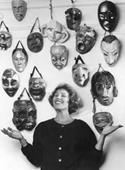 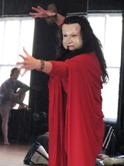
 |
Master Mask Protégé and apprentice of Pierre LeFevre at Julliard School
Founding Artistic Director of internationally acclaimed mask & puppet performance company Mask Work Unlimited, Shelley has taught classes and workshops for NYU, Yale, Circle in the Square, Smith, Brown, Stella Adler Conservatory, The Actors Studio MFA Program, The New School For Drama NYC, and Bard College, among many others. She worked with Jacques LeCoq, studied in Bali with Idi Bagnus Anom, and apprenticed for years to Pierre LeFevre of The Juilliard School. Shelley's recent directing and coaching credits include shows for Berkshire Theatre Festival, The Edinburgh Fringe Festival, and Terrence McNally's A PERFECT GANESH at Manhattan Theatre Club. Featured in Book By Nicole Potter Allworth Press “Movement for Actors." |
| |
| Nira Pullin - Period Styles Master teacher |
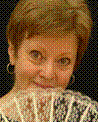

|
Professor, is the choreographer and Period Movement Specialist for the Wayne State University theatres as well as the director/choreographer of the WSU Movin’ Theatre. She holds a BA from the University of Evansville and an MA from Wayne State University. She has trained in New York, Chicago and the Stratford Festival of Canada. She is a recipient of WSU's President’s Award for Excellence in Teaching and has taught period movement and deportment throughout the US and internationally. Pullin contributed a chapter to the book Movement for Actors, A member of the Society of Stage Directors and Choreographers, Pullin is a certified instructor in the Authentic Pilates Method of Body Conditioning. Featured in Book By Nicole Potter Allworth Press “Movement for Actors." |
| |
| Kari Margolis - Co-Founder and Artistic Director of the Margolis Brown Adaptors Company |


|
Kari Margolis Co-Founder and Artistic Director of the Margolis Brown Adaptors Company originally established in New York City in 1984. She has written, directed, designed costumes, props and sets for fourteen critically acclaimed evening-length productions that have toured nationally and internationally to Singapore, Berlin, London, Barcelona and throughout Mexico and Canada and has created site-specific works for such places as the Brooklyn Museum, the Beach at Coney Island and the Minnesota Science Museum. Over the last 25 years, Ms. Margolis has developed a unique physical approach to actor training (Margolis MethodTM). She has served on the Theatre Faculty at the University of Minnesota and runs a private actor training center in Sullivan County NY with an international student body of fifty students a year.
Ms. Margolis has served on many national theatre panels including the National Endowment for the Arts. She conducts master classes, extended residencies and lecture demonstrations throughout the United States and internationally and is a published author, most recently published by Allworth Press, NY. Ms Margolis' work has been recognized with six Fellowships from the National Endowment for the Arts, two Minnesota State Arts Board Fellowships, a Bush Foundation Artist Fellowship, two McKnight Intermedia Arts Fellowships, a Creative Capital National Artist Fellowship, a Pew/TCG National Theatre Residency Fellowship, a Jerome Foundation Travel/Work Grant, a McKnight National Fellowship, a “Bessie”, New York Performance Award, a Brooklyn Arts Council, Outstanding Achievement in the Cultural Arts Award, and a New York Foundation for the Arts Performance Fellowship among others. Featured in Book By Nicole Potter Allworth Press “Movement for Actors.” |
| |
International Core Faculty & Award Winning Guest Artists |
| |
| Andrew Wade - Head of Voice at the Royal Shakespeare Company from 1990 - 2003 |
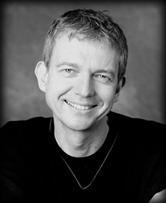
Featured in
 |
Andrew Wade was Head of Voice at the Royal Shakespeare Company from 1990 - 2003. He joined the Royal Shakespeare Company in 1987 as Assistant Voice Director to Cicely Berry. When he took over the Department his responsibilities involved overseeing all the voice work for the RST, Swan and TOP and for all touring, residences and up until the Company leaving the Barbican in 2001, the work in London as well. He co-directed and devised with Cicely Berry Journey's, Words, Words, Words, More Words and Lifespan - a poetry and prose collection collated into a theatrical program, being commissioned by the BBC World Service and winning a Bronze Medal at the International Radio Festival in New York in 2000.Andrew has a particular interest in exploring language practically, which he fulfills by working with youngsters, students, teachers and academics.
Andrew has traveled widely, lecturing, leading Master Classes and Workshops, as well as coaching with theatre companies and actors abroad - Australia, Belgium, Colombia, Canada, Denmark, France, Germany, Greece, India, Ireland, Japan, The Netherlands, New Zealand, Norway, Poland, Russia, South Africa, Sweden, Singapore, Switzerland and extensively in the United States of America. He has published several articles on his work. In conjunction with Cicely Berry, they have recorded WORKING SHAKESPEARE, a series on voice and text work with Helen Hunt, Samuel L Jackson, Toby Stevens, Clare Danes, Blythe Danner, Emily Watson and introduced by Jeremy Irons. He is currently working with Source Books on SHAKESPEARE EXPERIENCE, editions of Shakespearean recordings, plus audio excerpts with contemporary actors, currently As You Like It, Julius Caesar, Macbeth and Romeo & Juliet. Andrew trained at the Rose Bruford College of Speech and Drama from 1973-1976. He has worked in many different drama schools including Mountview Theatre School, the Rose Bruford College, the Arts Educational School and was Head of Voice at East 15. Andrew was Verse Consultant on the film SHAKESPEARE IN LOVE. He also coached Courtney Love for the role of Lady Macbeth, which is currently in the making. Andrew has just returned from Toronto after working on the new musical LORD OF THE RINGS. |
|
| Ilse Pfeifer - Master teacher Voice Fitzmaurice |
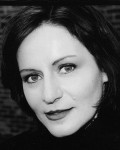 |
Ilse Pfeifer is currently teaching Fitzmaurice Voicework and Movement at the Actors Movement Studio, and was also a Guest Teacher at Eastern Connecticut State University and at Fordham University. She has taught workshops in NYC for students from Eastern New Mexico University and Central and Eastern Connecticut State University. She has also taught at Gate Acting Conservatory, NYU/Playwrights Horizons, and the Actors Center in New York City, Sioux Falls University in South Dakota, University of New Mexico, and in Europe at the Freie Universitaet in Berlin and the Berlin School of Performing Arts, and she presented an introduction to Fitzmaurice Voicework at the KCACTF conference in Providence Rhode Island in January 2005.
She worked as movement coach for Arch Street Pictures and filmmaker Robert Columbo. Ilse danced with Zero Moving Dance Company for five years, and later worked as performing artist, choreographer, and bodyworker. Her work has been presented by the Next Move Festival at Annenberg Center, American Music Theatre Festival, City Dances, The Arts Bank, and Movement Theatre International in Philadelphia, and by Lincoln Center Out-of-Doors Festival, PS 122, and Dixon Place in NYC, as well as Baltimore Theatre Project. She worked as interviewer with PBS documentary filmmaker Glenn Holsten in Love Park, danced in choreographer Kevin O'Day's Storage Space, danced and acted in Helmut Gottschild's Frogs, Karen Bamonte's Salon Evenings, and sang in radio artist Gregory Whitehead's Nothing but Fog. Ilse conceptualized and produced I gaze at the prairie and see things and MIX. Both were aired in part by PBS in Philadelphia. She was honored as a Pew Fellowships in the Arts Discipline winner in Choreography & Dance-based Performance Art. Graduate Diploma Royal Academy of Dancing, London; Graduate Diploma Imperial Society of Teachers of Dancing, London. |
| |
| Andrei Malaev-Babel - Author Actor Director Master Teacher |
   |
Yevgeny Vakhtangov: A Critical Portrait, Routledge, London and New York, 2012.
The Vakhtangov Sourcebook, Routledge, London and New York, 2011.
Guide to the Psychological Gesture 2003 -
Routledge edition of Michael Chekhov’s To the Actor. |


|
M.F.A. Vakhtangov Theater Institute, Moscow, Russia Head of Acting and an Associate Professor of Theatre at the FSU/Asolo Conservatory for Actor Training in Sarasota, Florida. Mr. Malaev-Babel has served on the faculty of The Catholic University of America in Washington, DC. He is a member of the international faculty and on the board of MICHA, the Michael Chekhov Association in New York City. Since 1997, Mr. Malaev-Babel has served as the Producing Artistic Director for the Stanislavsky Theater Studio (STS), an award-winning company and conservatory in Washington, DC. For STS, he co-adapted, directed and/ or played leading roles in productions such as Goethe’s Faust, Cervantes’ Don Quixote, Chekhov’s The Seagull, Neil Simon’s The Good Doctor, Brian Friel’s Fathers and Sons, Moliere’s Le Malade Imaginaire, Gogol’s Dead Souls and Dostoyevsky’s Crime and Punishment and The Brothers Karamazov. In 2000 he was nominated for a Helen Hayes Award as an Outstanding Director for the STS production of Dostoyevsky’s The Idiot. Under Mr. Malaev-Babel’s artistic direction, the company received five Helen Hayes Award nominations and won two consecutive Helen Hayes Awards. His productions were presented at The Kennedy Center and The National Theater in Washington, DC, where he also appeared as a performer.
Mr. Malaev-Babel’s reputation as one of the leading experts on the Stanislavsky/ Vakhtangov/Michael Chekhov theater techniques, brought him special engagements and commissions from institutions such as The Smithsonian Institution, The World Bank, The Keenan Institute for Advanced Russian Studies of the Woodrow Wilson International Center for Scholars and the Russian Embassy in the US. He is working nationally and internationally, conducting workshops, presenting and performing for conferences, festivals and theater programs, including St. Petersburg Theater Academy (St. Petersburg, Russia), Volkov Theater Institute (Yaroslavl, Russia), The University of Windsor (Canada), Stanford University, Actors Movement Studio (New York, NY) and The Arena Stage Theater (Washington, DC), Young Vic Theatre (London, UK), Michael Chekhov Studio London (UK). He is the author of the Guide to the Psychological Gesture published in the 2003 Routledge edition of Michael Chekhov's seminal book, To the Actor. Mr. Malaev- Babel’s groundbreaking volume of Yevgeny Vakhtangov’s heritage, The Vakhtangov Sourcebook, came out from Routledge in March of 2011. His Yevgeny Vakhtangov, the first English-language monograph on the Russian theatrical innovator, came out from Routledge in September of 2012., Andrei Malaev-Babel is a graduate of the renowned Vakhtangov Theater Institute in Moscow, Russia. He trained and worked under Alexandra Remizova, co-founder of the Vakhtangov Theater, Stanislavsky’s student and Vakhtangov’s protégé. In 1985, he co-founded the Moscow Chamber Forms Theater, one of the first private professional theater companies in Russia. |
| |
|
Lisa Dalton - Master Teacher of - Michael Chekhov Technique
Artistic Director “National Michael Chekhov Association”
Co-Producer Documentary From Russia to Hollywood, award winning documentary about Michael Chekhov |
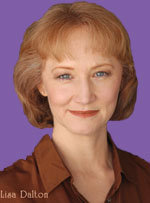 |
Lisa Dalton Master Teacher Michael Chekhov’s Acting Technique Since 1994, Lisa has been a Master Instructor of the Chekhov Theatre Institute at the University of Southern Maine; currently the only University endorsed Chekhov Technique Teacher Certificate Training Track worldwide. She was a co-founder of the International Michael Chekhov Association, administrating, teaching, directing and acting in Moscow, Berlin, and London. She was the Creator/Artistic Director of the first two Michael Chekhov International Workshops in the Americas, at the Eugene O’Neill Theatre Center. She has been a guest teacher/adjunct at numerous Universities including The Sorbonne, NYU, Brooklyn College, Curry College, Maharishi University, Emerson and Central Connecticut State University and as an adjunct at TCU. For eighteen years, Lisa taught at the American Film Institute with the Hollywood SAG Conservatory as well as at her studio, the Chekhov Connection Studio. She has judged numerous events including TV Emmy’s, Cable Ace Awards, Independent Spirit Awards, Irene Ryan Preliminaries, International and State Thespian Festivals, and the Donna Reed Festival.
Lisa Dalton’s professional performance career includes co-founding and performing for 4 years with the Bond Street Theatre at La Mama in New York. Bond Street is known for it’s eco-socio multi-genre performances that integrate into its original plays extensive circus skills, combat, puppetry, mask, mime, vocal and instrumental music. Techniques focused on many European approaches including Grotowski, Le Coq, Polish Mime Theatre, Commedia ‘dell, Meyerholdt Biomechanics and Marital Arts. With these skills Lisa was also a professional Stuntwoman and clown/comedienne for ten additional years on the east coast. Credits include Splash, Ghostbusters, F/X, Money Pit, The Last Dragon, Crocodile Dundee, Saturday Night Live, 4 Soap Operas, and numerous commercials. In Los Angeles, as an actress, Lisa’s TV credits include ER, Melrose Place, Dr. Quinn, and Carnivale, many more commercials, independent films and plays. She is a recipient of the DramaLogue Award for Outstanding Achievement in Acting. As a producer/director, awards include Houston Worldfest, Hollywood Film Festival, London Film Festival, and Petersburg Film Festival, working on over one hundred film, video and stage projects.
|
|
| Virginia Scott - Master Teacher “Clown” |
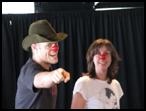 |
Virginia was named by clown master Christopher Bayes (Head of Physical Acting at Yale School of Drama) as the first faculty member of his Funny School of Good Acting and is certified to teach his clown technique. She has served as Bayes' assistant for eight years and is working on a book with him, which will detail his approach to clown. Along the way, she assisted Bayes in the creation and direction of Clowns presented at the Public Theater and Ruzzante at the NYU Graduate Acting Program. Virginia has taught Clown in New York at the Actor's Center, Marymount Manhattan College, the Michael Howard Studios, CAP 21, the Glass Contraption Clown Theatre Company, the Leviathan Lab and Christopher Bayes' Funny School of Good Acting. She also directed the NYC Clown Lab; the first training environment in New York designed to bring together clowns of different backgrounds for exchange, experimentation, material development and training. As a director and deviser, Virginia is known for her fast-paced, comic and visually exciting style. Her work has been seen in New York at UCB, The Irish Repertory Theatre, Ars Nova, 59E59, The Barrow Group Theatre, Chasama's Palace of Variety, The New York Fringe Festival, The PIT and the International Clown Festival; regionally at The US Comedy Arts Festival in Aspen, The Comedy Central Theatre in Los Angeles, and UCB LA in Los Angeles; and internationally at The Guilded Balloon in Edinburgh, The Centaur Theatre in Montreal, the Grahamstown International Festival in South Africa and festivals throughout Canada. |
| |
| Vangeline - International Master Teacher Butho Movement |
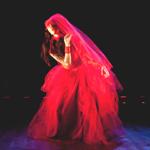 |
Vangeline is a teacher, dancer, and choreographer specializing in the Japanese postwar avant-garde movement form Butoh. She is the Artistic Director of the Vangeline Theater(NYC), a dance company firmly rooted in the tradition of Japanese Butoh while carrying it into the 21st century.Vangeline's choreographic work spans performance on stage and in film and has been performed in hundreds of venues in major cities throughout the US for the past 10 years. She has received numerous positive reviews in publications such as the New York Times, Los Angeles Times, and LA Weekly.Time OUT Chicago recently named Vangeline's, "one of the best Dance Visits of 2011." Her critically acclaimed choreographed works have been presented in New York at Joyce SoHo, White Wave, Here Arts Center, the New Museum, Dance Theater Workshop, PS122 Performance Space, and Abrons Arts Center to name a few. She was the recipient of a sixmonth artist residency at PS 122 Performance Space ("New, New Stuff"); since 2006 she has received thirteen prestigious awards from the Puffin Foundation, the Japan Foundation, the New York Department of Cultural Affairs, the New York Foundation for the Arts, the Asian American Arts Alliance, the Actor's Fund, and the Robert Friedman Foundation. Vangeline recently performed the critically acclaimed role of Elizabeth Short in the Los Angeles production of 'The Chanteuse and the Devil's Muse.' directed by David J (Bauhaus). Her performance was unanimously praised by the Los Angeles press. THEATER IN LA selected her performance as one of the best 2011 performances in Los Angeles.
Current projects include a starring role alongside actors James Franco and Winona Ryder inthe feature film by director Jay Anania, 'The Letter (2012-Lionsgate).' Vangeline was also featured in an eight-page spread in Vanity Fair Italia in August 2012. She has taught Butoh workshops worldwide and has lectured about the history of Butoh at Cornell University, New York University, Brooklyn College, Denton University and many other cultural institutions in the United States. She also has taught an award-winning program to incarcerated women at the Bayview Correctional Facility in New York City since 2007. Among Vangeline's teachers are the renowned Butoh masters Diego Pinon from the Butoh Ritual Mexicano theater, Yoshito Ohno, Akira Kasai, Yumiko Yoshioka, Ko Murobushi, Tetsuro Fukuhara, and Katsura Kan. Claudia la Rocco from the New York Times wrote that Vangeline is "captivating in her devotion to simple movements"; Hampton Fancher, writer of cult movie "Blade Runner,"wrote that Vangeline's work is "poetry in motion"; and the Los Angeles Times wrote that" Vangeline moves with the clockwork deliberation of a practiced Japanese butoh artist." |
| |
| Heather Harpham - Master Teacher “Action Theater” |
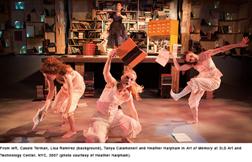

|
Heather Harpham has been teaching improvisation for over 10 years and is a Senior Teacher of Action Theater. Her most recent solo theater piece, Happiness, was selected for the One Woman Standing Festival in 2008. She has performed dance and theater work at venues throughout New York City including Dance Theater Workshop, Judson Church, Dixon Place, One Dream Theater, and Brooklyn Arts Exchange. Heather holds an MA and an MFA, in theater and creative writing respectively, from New York University.
Featured in American Theater Magazine 2011. |
| |
| Leslie Ann Timlick - Guild Certified Feldenkrais Practitioner, Certified in Meisner and Michael Chekhov Technique |
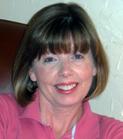
 |
Guild Certified Feldenkrais Practitioner Lesley has an MFA in Acting from the University of California, Davis and did post graduate work in theatre voice training & coaching at the National Theatre Conservatory/National Center for Voice & Speech. She is one of a few theatre voice and movement specialists who is also a Guild Certified Feldenkrais Practitioner. She Certified in Michael Chekhov Technique And Meisner Acting Technique. She is the former Chairperson of Theatre at Florida International University in Miami.She has also taught at New World School of The Arts, University of Oklahoma, University of Calif. Davis. & the Webster University Theatre Movement Institute. She has presented workshops across the U.S. on the Feldenkrais Method & is currently working on a text linking the Feldenkrais Method into acting. She is the Feldenkrais Guild representive for the Association of Theatre Movement Educators. She also served an officer for the Association of Theatre Movement Educators. She has studied with top theatre voice specialists Linklater, Berry, Rodenburg, Lessac. She has coached for such companies as New Theatre/Miami, Florida Shakespeare Theatre, Colorado Shakespeare Festival, Denver Center Theatre Company & the Sunshine Theatre, British Columbia, Canada.
Currently writing a book on Movement and Actor Training. |
|
| Gene Terruso - Master teacher Bobby Lewis Technique and Meisner Technique |
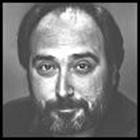 |
Director of Mahattanville College Theater and Dance Department, Former Artistic Director of Off-Broadway’s historic Provincetown Playhouse, where he staged A Mountain of Sundays with Oscar-winner Kim Hunter. While at the Provincetown, he developed that theatre’s New Play Series, involving the talents of such artists as Terrence McNally, Edward Herrman, and William Mastrosimone whose Asteroid had its debut at the Provincetown under Mr Terruso’s direction. His New York directing credits include Mamet’s The Blue Hour at Playwrights’ Horizons, The Actor’s Nightmare and Sister Mary Ignatius at the Nat Horne Theatre on Off-Broadway’s Theatre Row, the inaugural production of the American Ibsen Theatre, When We Dead Awaken, and Slices by Second City’s Barbara Hobart at the McCarter Theatre. He first appeared on Broadway with Colleen Dewhurst in Are You Now Or Have You Ever Been? and has since made numerous stage, film, and TV appearances including recurring roles in CBS’ Orphans, Waifs, and Wards and as Geoffrey Chaucer in The Canterbury Tales, broadcast on PBS.
He studied acting in Hollywood with the legendary Sanford Meisner, and continues to act having created the role of Primo Levi in the world premiere of Nick Patricca’s An Uncertain Hour, which received Chicago’s prestigious Joseph Jefferson Award. He also toured England as Tennessee Williams in the U.K. premiere of Mr. Williams and Miss Wood. During the 2001-02 season he portrayed Andy in Love Letters , Dukes Senior and Fredrick, as well as Corin the Shepard, in As You Like It with Philadelphia’s Arden Theatre Company, with whom he previously portrayed Sir Tony Belch in Twelfth Night. Other Philadelphia credits include Andrew Wyke in Sleuth and Henry II in The Lion in Winter at the Hedgerow Theatre. He has served on the Executive Committee of the Kennedy Center/American College Theatre Festival and as Chair for their Region III Playwrighting Award. He has taught at Rutgers University, the Pratt Institute, and Northern Illinois University (where he served as Director of the School of Theatre and Dance). He was the eighth President in the 114-year history of the American Academy of Dramatic Arts. He served as Director of the School of Theatre Arts at the University of the Arts in Philadelphia. He holds an MFA from Rutgers University, was awarded a 1996 Fulbright Lectureship to Belgium, and in 1975 was inducted into the national honors society Alpha Sigma Nu. |
| |
| Summer Institute Faculty Curriculum & Faculty featured in American Theater Magazine |
 |
"Actors on the Move"
10 performers analyze the training regimens that animate them on stage
The interviews in this collage of voices—actors and actor-trainers who are devotees of a range of movement techniques—
were conducted by the American Theatre editorial staff. Some are presented entirely in the artist's voice and others incorporate
the reporter's framing comments. |
| |
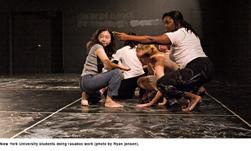 |
The method: Rasaboxes
The teachers: Richard Schechner, New York University;
Paula Murray Cole, Ithaca College, Ithaca, N.Y. |
In between scenes while performing Laertes in the Gallery Players's production of Hamlet in Brooklyn, the young classical actor Dan Lawrence juiced up his body to achieve a "rasic" performance. "Laertes appears early on in Shakespeare's play and then he disappears. When he reenters, he is already in a high emotional state," the 26-year-old Lawrence recalls. "He's ready to kill. While I'm off stage for an hour, I can go through my script as much as I want, but the real question is: How am I going to enter that emotional state physically? I definitely used rasabox training for that.
"Before I entered the stage, I started with the gestures. I brought in breath—and sounds, when I could. Obviously I wasn't shouting off stage, but I was preparing myself physically so that when I burst onto the stage, I was already there mentally. For me, rasabox training is a fail-safe system when something is wrong and I am not connecting. I have this physical way to jump-start my emotions."
According to the rasaboxes physical-theatre system developed by the theorist/director Richard Schechner in the 1980s and 1990s—which was in turn interculturally drawn from a manual of ancient Sanskrit performance theory called Natyasastra—human beings experience nine rasas (or "flavors" of feeling), which correspond to nine types of sthayi bhavas (or emotions). The rasa called raudra, for example, links up to the sthayi bhava called krodha, which means anger or rage. Other rasas correspond to desire/love, humor/laughter, pity/grief, energy/vigor, fear/shame, disgust, surprise/wonder and bliss. Schechner's theoretical précis Rasaesthetics blends the Natyasastra's performance theory with contemporary emotion research, neuroscience and Antonin Artaud's Western call for "an athlete of emotions." Schechner specifies that acting "is the art of presenting the sthayi bhavas so that both the performer and the partaker [i.e., the audience] can 'taste' the rasa."
Schechner and his East Coast Artists colleagues Michele Minnick and Paula Murray Cole have developed a series of orderly training exercises that combine breath, sound and movement with nine of the Sanskrit rasas, helping actors safely and effectively explore a wide range of emotions. Having cut his teeth professionally at Hudson Valley Shakespeare Festival in Garrison, N.Y., and Shakespeare Theatre Company in Washington, D.C., Lawrence was tutored by Cole, a theatre professor at Ithaca College and one of the many Schechner disciples who are certified to teach this training method. Rasaboxes has also been taught by Minnick, Rachel Bowditch, Fernando Calzadilla and Márcia Moraes in summer workshops offered at New York University. Introductory and intensive rasaboxes workshops have been offered at the Actors Movement Studio since 2005.
The actor begins to learn that each box has a different breath associated with it. After breath comes sound, and still later movement. According to Lawrence, "Once you go into the boxes and you have the gesture and breath, memories start to happen. Stories begin to develop in your head. Eventually you bring in monologues, texts and scenes. That's the best part, because you're experiencing rasas with other actors. The script is the piece of music. And the rasa is the annotation: the tempo, the quality of brightness or softness, all the sensations."
One advantage of the rasabox method is that it allows an actor the freedom to improvise, as if leaping into a cold pool of water. "You're defeating your rationality and critical thinking right away," Lawrence says. "You're getting into your area of vulnerability a lot faster. It's about spontaneity and training yourself not to pre-plan things." Moreover, the lengthier an actor's involvement has been with each rasabox, the richer the flavors when emotions are shared with other actors in the room. "How do you experience despair and happiness at the same time, for instance, like crying through tears of joy? The whole idea is that we already have the ingredients in our body for these things, and there is a way to cook them, a formula, to bring about the emotions." |
| |

 |
HEATHER HARPHAM, actor, New York City
The method: Action Theater
The teacher: Ruth Zaporah, Santa Fe, N.M.
"In the early 1990s, I took a five-month workshop with Ruth Zaporah. My background had been acting and writing, and what thrilled me about Ruth's work is that it seemed to synthesize those two processes: It was both generative, in the way writing is, and it was expressive and spontaneous and performative, in the way acting is. I was bowled over by the breadth and depth of inner resourcefulness that the work demanded. You couldn't fall back on physical clichés. You couldn't lean on the things that had brought you some success in the past. It asked you to be physically daring."Ruth never prescribes particular movements. She isn't ever asking you to leap or land, or to collapse the space between your knees and your shoulders. But she will ask you to go to an inner space and bring it into your body so you're not a talking head—bring it into your fingers. She will take what students were presenting, and then ask them to go deeper, to find more subtlety, more nuance.
"Now, all of this talk presents the work as an individual would see it. But a large part of the work is done as an ensemble that plays together musically. You might come in and stand in a circle and do breath work; you'd be creating a musical composition using rhythm or your breath—patterns, percussion—just with breath sound. Then you're playing with timing, position, dynamic shifts. Eventually, ultimately, you're playing with content, but not necessarily with a traditional story—rather with conditions, situations, that happen on stage.
"One primary way I use this form is to improvise to generate material. It inverts the relationship between body and page. You're not writing and then figuring out how to put it up; you already have it up, and you're transcribing off the body onto the page. I tinker a lot after I've got it. But it's a question of composition; once you've created the piece, the bulk of your staging work, in a certain sense, is done."In another realm, it's incredibly helpful to actors who are working with traditional texts to shake up their expectations of themselves and others. It blows open the scope of expressivity for an actor to be pulled way out of their normal range, way into non-naturalism, so that when they come back to scene work, it's with a fresh feeling. If you can learn to be truly present moment to moment, which is what Action Theater demands of you—if you can bring that elevated awareness back into your text-based work—you'll be dynamite, you'll be alive." |
| |
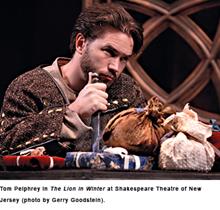
 
|
TOM PELPHREY, actor, Brooklyn, N.Y.
The method: Williamson Technique
The teacher: Janice Orlandi, artistic director,
Actors Movement Studio Conservatory
When Tom Pelphrey appeared last fall in Shakespeare Theatre of New Jersey's The Lion in Winter, he found—as he says he often does—that his training in Loyd Williamson's movement technique stood him in good stead. "It sort of felt like a melodrama—there are all these massive needs and hurts and betrayals, and this big longing that's really larger-than-life," Pelphrey says of James Goldman's oft-performed play about scheming royals. "And I felt very free to express all those feelings in my body. I was doing gestures and moving in a way that I don't think I would usually do in a more naturalistic play, but the show called for it—and I never had a fear of jumping off the ledge. I think you can trace my confidence in that back to the movement technique I learned with Janice Orlandi."
At Rutgers State University in New Jersey, Orlandi imparted to Pelphrey a technique she learned from the training innovator Loyd Williamson. A performer and designer, Williamson noticed that actors—particularly young actors—who were encouraged to tap big, volatile emotions by Method-style training ran into trouble finding a way to express them, particularly with their bodies. He developed his movement training to release the tension of such unexpressed emotions into actors' bodies.
Pelphrey says he noticed much the same thing about himself as a young actor. "When you're a young actor, you don't know what to do with a lot of these feelings, so you become tense," explains Pelphrey, who achieved some fame on TV's "Guiding Light" and is a co-founding member of New York's Apothecary Theatre Company. "This technique allows you to have all these feelings you're not sure what to do with, but forces you to run them through your body. It teaches you to release them into these structured movements." The program includes sections such as the "drunk salon"—an ensemble-wide improv with pretend alcohol—as well as the self-explanatory "animal work" and a period-style salon. The result, as Pelphrey says, is "a means to an end." Unlike the roles in The Lion in Winter, many naturalistic stage and film parts won't call for a lot of stylized or structured movements. But, says Pelphrey, "You slowly realize how you can use Williamson's training in your work—you start to recognize how your body feels when it's open and available versus when you're tense and shut down."TOM PELPHREY, Day time Drama Emmy Award Winner TV's "Guiding Light" Nominated 4 times Winner Best new young Talent 2006 and 2008, Broadway 2012 “The End of the Rainbow.” |
| |
| |
| |
|
|

